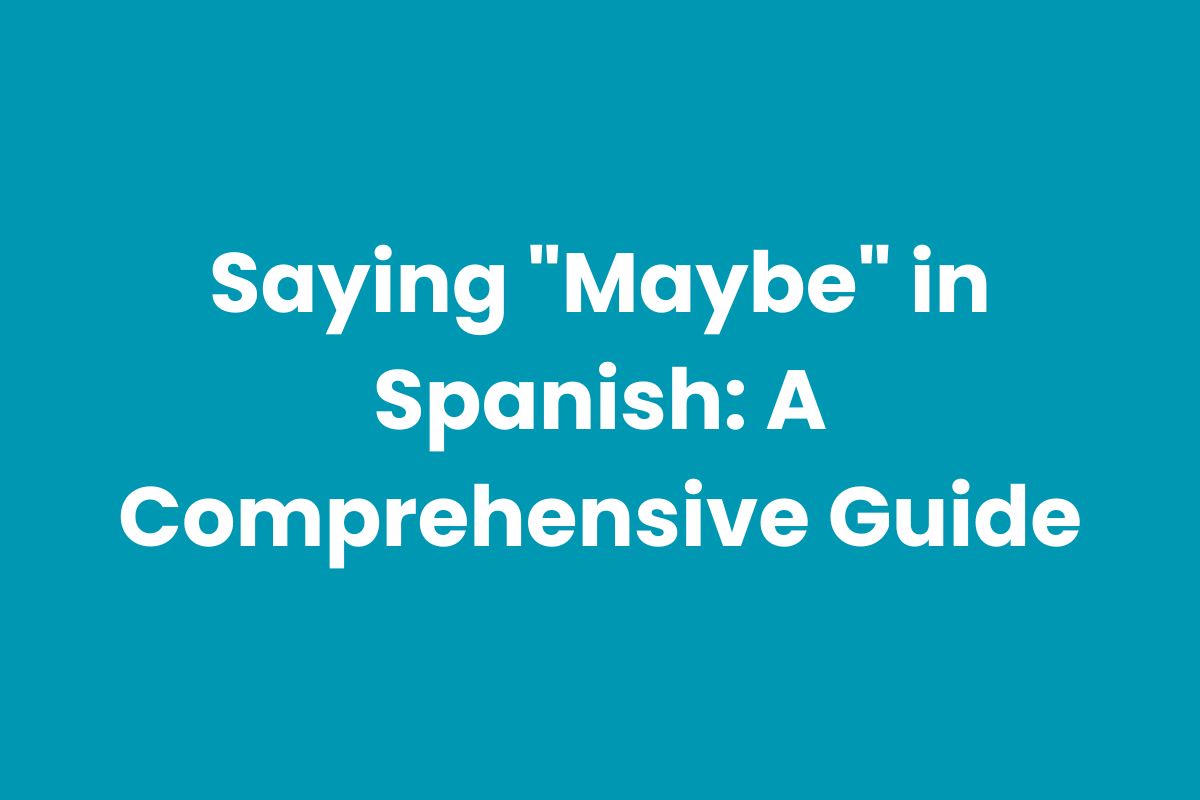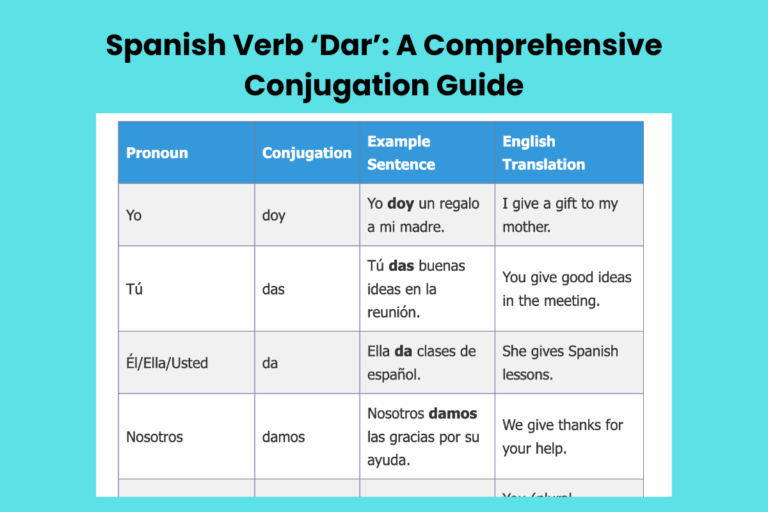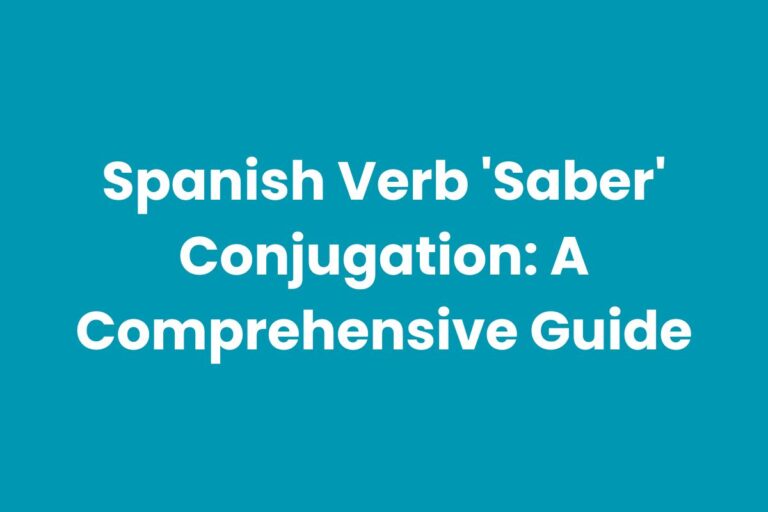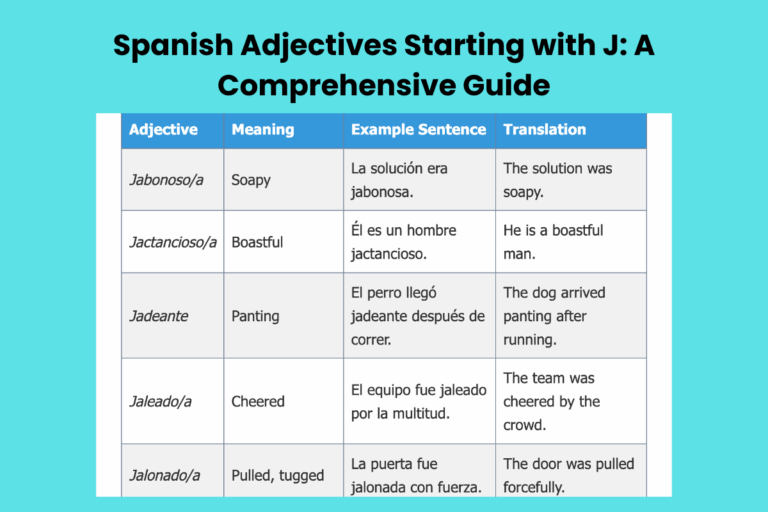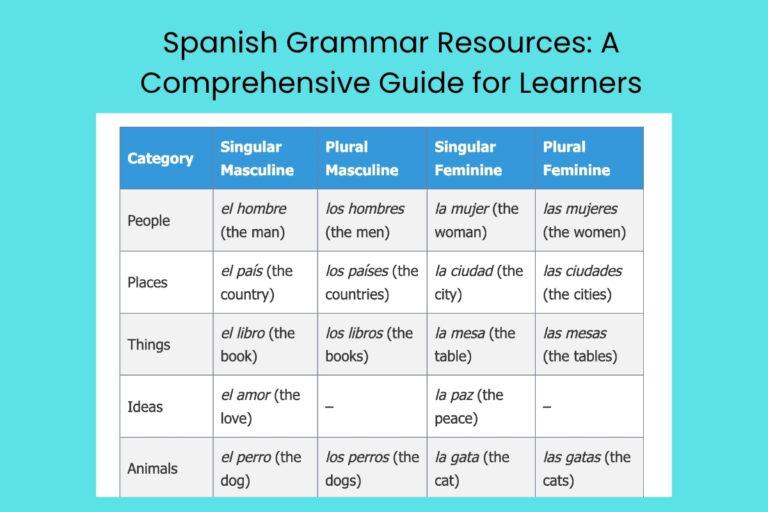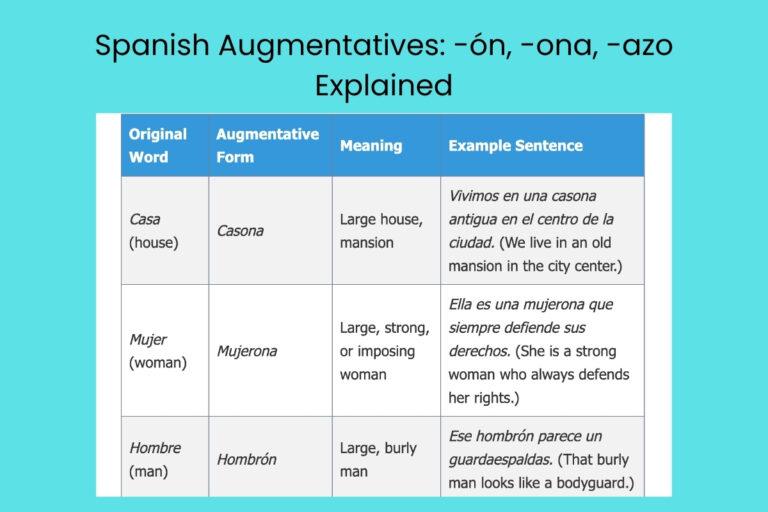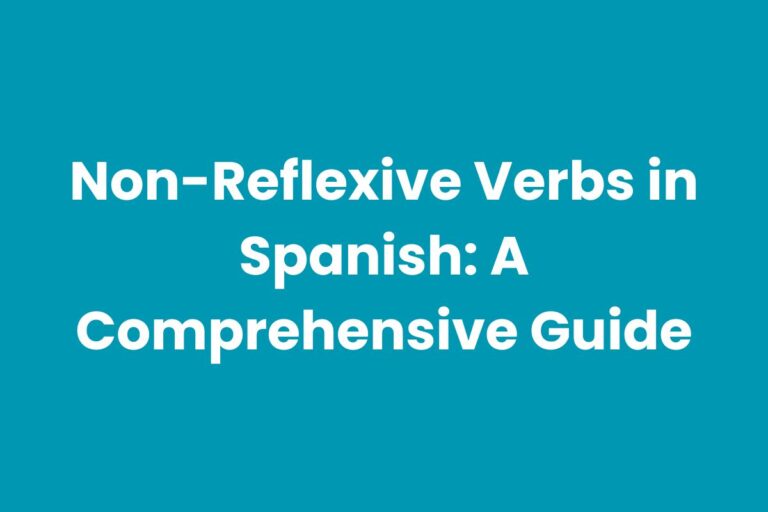Saying “Maybe” in Spanish: A Comprehensive Guide
Understanding how to express uncertainty is crucial for effective communication in any language. In Spanish, there are several ways to say “maybe,” each with its nuances and specific contexts.
This article provides a comprehensive guide to mastering these expressions, covering everything from basic translations to advanced idiomatic phrases. Whether you’re a beginner or an advanced learner, this guide will equip you with the knowledge and practice you need to confidently express doubt or possibility in Spanish.
By exploring the various options and their appropriate usage, you’ll be able to communicate more accurately and naturally, enhancing your overall fluency and comprehension of the Spanish language.
This guide is designed for students of Spanish at all levels, from beginners just starting to learn the basics to advanced learners looking to refine their understanding of idiomatic expressions. Native English speakers learning Spanish, Spanish teachers, and translators will also find this resource invaluable.
By the end of this article, you will be able to use “maybe” in a variety of contexts and situations, allowing you to convey uncertainty and possibility with accuracy and confidence.
Table of Contents
- Definition of “Maybe” in Spanish
- Structural Breakdown of “Quizás” and “Tal Vez”
- Types and Categories of “Maybe” Expressions
- Examples of “Maybe” in Spanish
- Usage Rules for “Maybe” Expressions
- Common Mistakes When Saying “Maybe” in Spanish
- Practice Exercises
- Advanced Topics: Subjunctive Mood
- Frequently Asked Questions
- Conclusion
Definition of “Maybe” in Spanish
In Spanish, there isn’t a single, direct translation of “maybe.” Instead, several expressions convey the same meaning, each with slightly different nuances and levels of formality. The most common translations include quizás, tal vez, a lo mejor, puede ser, and igual. These expressions are used to indicate uncertainty, possibility, or doubt about a particular situation or event.
The primary function of these expressions is to soften statements, avoid commitment, or express a lack of certainty. They can be used in a variety of contexts, from casual conversations to more formal discussions.
The choice of which expression to use often depends on the speaker’s personal preference, the level of formality required, and the specific shade of meaning they wish to convey.
Quizás and tal vez are adverbs that directly translate to “perhaps” or “maybe.” A lo mejor is an adverbial phrase that also means “maybe” or “perhaps.” Puede ser translates to “it could be” or “maybe,” and igual (in some regions) can mean “maybe” or “possibly.” Understanding the subtle differences between these options is key to mastering the art of expressing uncertainty in Spanish.
Structural Breakdown of “Quizás” and “Tal Vez”
Quizás and tal vez are both adverbs that can be placed either before or after the verb in a sentence. They are often used with the subjunctive mood, especially when expressing a higher degree of doubt or uncertainty. When used with the indicative mood, they suggest a greater possibility.
The structure is relatively simple. You can use them at the beginning of the sentence to set the tone of uncertainty or place them within the sentence to emphasize a specific part of the statement.
Here are some examples to illustrate the structural flexibility:
- Quizás vaya a la fiesta. (Maybe I will go to the party.)
- Vaya quizás a la fiesta. (I will go maybe to the party.)
- Tal vez llueva mañana. (Maybe it will rain tomorrow.)
- Llueva tal vez mañana. (It will rain maybe tomorrow.)
The placement of the adverb can subtly alter the emphasis of the sentence. Placing it at the beginning often signals that the entire statement is uncertain, while placing it after the verb can emphasize the action itself.
Types and Categories of “Maybe” Expressions
There are several ways to express “maybe” in Spanish, each with its own nuances. Here are the main categories:
1. Adverbs of Doubt: Quizás and Tal Vez
These are the most direct translations of “maybe” and are often interchangeable. They can be used in a wide range of contexts, from formal to informal.
2. Adverbial Phrase: A lo Mejor
This phrase also means “maybe” or “perhaps” but is slightly more informal than quizás and tal vez. It is commonly used in everyday conversation.
3. Impersonal Expression: Puede Ser
This expression translates to “it could be” and is used to express a possibility. It is often used when the speaker is unsure about the outcome of a situation.
4. Regional Usage: Igual
In some Latin American countries, particularly Argentina and Uruguay, igual can be used to mean “maybe.” This usage is more informal and should be used with caution in other regions.
5. Conditional Tense: Podría
The conditional tense of the verb “poder” (to be able to), “podría,” can also convey a sense of “maybe” or “could.” It expresses a possibility or a hypothetical situation.
Examples of “Maybe” in Spanish
Here are some examples of how to use the different expressions for “maybe” in Spanish, categorized for clarity.
Examples with Quizás
Quizás is one of the most common ways to say “maybe” and is suitable for various contexts. It often implies a degree of uncertainty or doubt.
Table 1: Examples using Quizás
| Spanish Sentence | English Translation |
|---|---|
| Quizás vaya al cine esta noche. | Maybe I’ll go to the cinema tonight. |
| Quizás tenga tiempo para ayudarte mañana. | Maybe I’ll have time to help you tomorrow. |
| Quizás ella sepa la respuesta. | Maybe she knows the answer. |
| Quizás llueva mañana. | Maybe it will rain tomorrow. |
| Quizás no sea una buena idea. | Maybe it’s not a good idea. |
| Quizás él llegue tarde. | Maybe he will arrive late. |
| Quizás necesitemos más tiempo. | Maybe we need more time. |
| Quizás sea mejor esperar. | Maybe it’s better to wait. |
| Quizás no esté en casa. | Maybe he/she isn’t home. |
| Quizás me compre un coche nuevo. | Maybe I will buy a new car. |
| Quizás apruebe el examen. | Maybe I will pass the exam. |
| Quizás vayamos de vacaciones este verano. | Maybe we’ll go on vacation this summer. |
| Quizás no tenga suficiente dinero. | Maybe I won’t have enough money. |
| Quizás ella me llame mañana. | Maybe she will call me tomorrow. |
| Quizás él no quiera venir. | Maybe he doesn’t want to come. |
| Quizás sea verdad. | Maybe it’s true. |
| Quizás tengamos que mudarnos. | Maybe we have to move. |
| Quizás no sea el momento adecuado. | Maybe it’s not the right time. |
| Quizás él esté ocupado. | Maybe he is busy. |
| Quizás ella esté enfadada. | Maybe she is angry. |
| Quizás lo haga la semana que viene. | Maybe I’ll do it next week. |
| Quizás no lo entienda. | Maybe he/she doesn’t understand it. |
| Quizás no haya nadie en casa. | Maybe there’s nobody home. |
| Quizás no tenga la respuesta. | Maybe I don’t have the answer. |
| Quizás haga frío mañana. | Maybe it will be cold tomorrow. |
| Quizás no sea tan difícil. | Maybe it’s not so difficult. |
| Quizás no lo sepa. | Maybe he/she doesn’t know. |
| Quizás no sea necesario. | Maybe it’s not necessary. |
| Quizás no esté de acuerdo. | Maybe he/she doesn’t agree. |
Examples with Tal Vez
Tal vez is another common way to express “maybe” and is very similar in usage to quizás. It also conveys a sense of possibility or uncertainty.
Table 2: Examples using Tal Vez
| Spanish Sentence | English Translation |
|---|---|
| Tal vez vaya a la playa este fin de semana. | Maybe I’ll go to the beach this weekend. |
| Tal vez tenga que trabajar hasta tarde. | Maybe I have to work late. |
| Tal vez él nos visite pronto. | Maybe he will visit us soon. |
| Tal vez ella esté ocupada. | Maybe she is busy. |
| Tal vez no sea la mejor opción. | Maybe it’s not the best option. |
| Tal vez tengamos suerte. | Maybe we’ll get lucky. |
| Tal vez él no venga. | Maybe he won’t come. |
| Tal vez necesitemos más ayuda. | Maybe we need more help. |
| Tal vez me compre una moto. | Maybe I will buy a motorcycle. |
| Tal vez apruebe la asignatura. | Maybe I will pass the subject. |
| Tal vez no esté de humor. | Maybe I’m not in the mood. |
| Tal vez lo haga mañana. | Maybe I’ll do it tomorrow. |
| Tal vez no lo sepa. | Maybe he/she doesn’t know it. |
| Tal vez no quiera ir. | Maybe he/she doesn’t want to go. |
| Tal vez sea mejor así. | Maybe it’s better this way. |
| Tal vez tengamos que esperar. | Maybe we have to wait. |
| Tal vez no sea el momento. | Maybe it’s not the moment. |
| Tal vez él no pueda venir. | Maybe he can’t come. |
| Tal vez ella esté cansada. | Maybe she’s tired. |
| Tal vez no lo entienda. | Maybe he/she doesn’t understand. |
| Tal vez no haya nadie. | Maybe there’s nobody. |
| Tal vez no tenga tiempo. | Maybe I don’t have time. |
| Tal vez no sea verdad. | Maybe it’s not true. |
| Tal vez haga sol mañana. | Maybe it will be sunny tomorrow. |
| Tal vez esté lloviendo. | Maybe it’s raining. |
| Tal vez no sea necesario. | Maybe it’s not necessary. |
| Tal vez no esté bien. | Maybe he/she isn’t well. |
| Tal vez no sea suficiente. | Maybe it’s not enough. |
| Tal vez no le guste. | Maybe he/she doesn’t like it. |
Examples with A lo Mejor
A lo mejor is an adverbial phrase that also means “maybe” or “perhaps”. It’s slightly more informal than quizás and tal vez.
Table 3: Examples using A lo Mejor
| Spanish Sentence | English Translation |
|---|---|
| A lo mejor voy al partido. | Maybe I’ll go to the game. |
| A lo mejor ella tiene razón. | Maybe she is right. |
| A lo mejor llueve esta tarde. | Maybe it will rain this afternoon. |
| A lo mejor no es tan caro. | Maybe it’s not that expensive. |
| A lo mejor él llega en una hora. | Maybe he will arrive in an hour. |
| A lo mejor necesitamos otro coche. | Maybe we need another car. |
| A lo mejor ella sabe dónde está. | Maybe she knows where it is. |
| A lo mejor no tengo tiempo. | Maybe I don’t have time. |
| A lo mejor me compro una bicicleta. | Maybe I will buy a bicycle. |
| A lo mejor apruebo el curso. | Maybe I will pass the course. |
| A lo mejor no quiero ir. | Maybe I don’t want to go. |
| A lo mejor lo hago después. | Maybe I’ll do it later. |
| A lo mejor no lo sabe. | Maybe he/she doesn’t know it. |
| A lo mejor no quiere venir. | Maybe he/she doesn’t want to come. |
| A lo mejor es verdad. | Maybe it’s true. |
| A lo mejor tenemos que hablar. | Maybe we have to talk. |
| A lo mejor no es el lugar. | Maybe it’s not the place. |
| A lo mejor él no puede ayudar. | Maybe he can’t help. |
| A lo mejor ella está ocupada. | Maybe she’s busy. |
| A lo mejor no lo entiende. | Maybe he/she doesn’t understand. |
| A lo mejor no hay nadie aquí. | Maybe there’s nobody here. |
| A lo mejor no tiene dinero. | Maybe he/she doesn’t have money. |
| A lo mejor no es correcto. | Maybe it’s not correct. |
| A lo mejor hace frío mañana. | Maybe it will be cold tomorrow. |
| A lo mejor está nevando. | Maybe it’s snowing. |
| A lo mejor no es necesario eso. | Maybe that’s not necessary. |
| A lo mejor no se siente bien. | Maybe he/she doesn’t feel well. |
| A lo mejor no es suficiente esto. | Maybe this isn’t enough. |
| A lo mejor no le gusta eso. | Maybe he/she doesn’t like that. |
Examples with Puede Ser
Puede ser translates to “it could be” and is used to express a possibility. It often implies that the speaker is considering a possible outcome.
Table 4: Examples using Puede Ser
| Spanish Sentence | English Translation |
|---|---|
| Puede ser que tenga razón. | Maybe I’m right. |
| Puede ser que llueva. | It could be that it rains. / Maybe it will rain. |
| Puede ser que él no quiera venir. | It could be that he doesn’t want to come. / Maybe he doesn’t want to come. |
| Puede ser que ella esté ocupada. | It could be that she is busy. / Maybe she is busy. |
| Puede ser que necesitemos más tiempo. | It could be that we need more time. / Maybe we need more time. |
| Puede ser que sea una buena idea. | It could be that it’s a good idea. / Maybe it’s a good idea. |
| Puede ser que él llegue tarde. | It could be that he arrives late. / Maybe he will arrive late. |
| Puede ser que me compre una casa. | Maybe I will buy a house. |
| Puede ser que apruebe todo. | Maybe I will pass everything. |
| Puede ser que no quiera hablar. | Maybe I don’t want to talk. |
| Puede ser que lo haga después. | Maybe I’ll do it later. |
| Puede ser que no lo sepa. | Maybe he/she doesn’t know it. |
| Puede ser que no quiera salir. | Maybe he/she doesn’t want to go out. |
| Puede ser que sea cierto. | Maybe it’s true. |
| Puede ser que tengamos que irnos. | Maybe we have to leave. |
| Puede ser que no sea el lugar. | Maybe it’s not the place. |
| Puede ser que él no pueda hacer nada. | Maybe he can’t do anything. |
| Puede ser que ella esté confundida. | Maybe she’s confused. |
| Puede ser que no lo comprenda. | Maybe he/she doesn’t understand. |
| Puede ser que no haya nadie. | Maybe there’s nobody. |
| Puede ser que no tenga eso. | Maybe he/she doesn’t have that. |
| Puede ser que no sea correcto. | Maybe it’s not correct. |
| Puede ser que haga calor mañana. | Maybe it will be hot tomorrow. |
| Puede ser que esté nevando mucho. | Maybe it’s snowing a lot. |
| Puede ser que no sea suficiente. | Maybe it’s not enough. |
| Puede ser que no esté feliz. | Maybe he/she isn’t happy. |
| Puede ser que no le guste nada. | Maybe he/she doesn’t like anything. |
Examples with Igual
In some Latin American countries, particularly Argentina and Uruguay, igual can be used to mean “maybe.” This usage is informal.
Table 5: Examples using Igual
| Spanish Sentence | English Translation |
|---|---|
| Igual voy. (Argentina/Uruguay) | Maybe I’ll go. |
| Igual tiene razón. (Argentina/Uruguay) | Maybe she’s right. |
| Igual llueve. (Argentina/Uruguay) | Maybe it will rain. |
| Igual me compro algo. (Argentina/Uruguay) | Maybe I’ll buy something. |
| Igual apruebo. (Argentina/Uruguay) | Maybe I’ll pass. |
| Igual no quiero salir. (Argentina/Uruguay) | Maybe I don’t want to go out. |
| Igual lo hago después. (Argentina/Uruguay) | Maybe I’ll do it later. |
| Igual no lo conoce. (Argentina/Uruguay) | Maybe he/she doesn’t know him/her. |
| Igual no quiere venir. (Argentina/Uruguay) | Maybe he/she doesn’t want to come. |
| Igual es mejor así. (Argentina/Uruguay) | Maybe it’s better this way. |
| Igual no tengo tiempo. (Argentina/Uruguay) | Maybe I don’t have time. |
| Igual no es cierto. (Argentina/Uruguay) | Maybe it’s not true. |
| Igual hace sol mañana. (Argentina/Uruguay) | Maybe it will be sunny tomorrow. |
| Igual está nevando mucho. (Argentina/Uruguay) | Maybe it’s snowing a lot. |
| Igual no es necesario eso. (Argentina/Uruguay) | Maybe that’s not necessary. |
| Igual no se siente bien. (Argentina/Uruguay) | Maybe he/she doesn’t feel well. |
| Igual no es suficiente esto. (Argentina/Uruguay) | Maybe this isn’t enough. |
| Igual no le gusta nada. (Argentina/Uruguay) | Maybe he/she doesn’t like anything. |
Usage Rules for “Maybe” Expressions
When using expressions like quizás, tal vez, and puede ser, it’s important to understand the grammatical rules that govern their usage. The most crucial aspect is the use of the subjunctive mood. Here are the key rules:
- Subjunctive Mood: When expressing a high degree of doubt or uncertainty, use the subjunctive mood after quizás, tal vez, and puede ser que.
- Indicative Mood: When expressing a higher degree of possibility, use the indicative mood.
- Placement: Quizás and tal vez can be placed at the beginning or within the sentence. A lo mejor usually comes at the beginning.
- Puede Ser Que: When using puede ser que, always use the subjunctive mood.
- Regional Variations: Be aware of regional variations, such as the use of igual in Argentina and Uruguay.
For example:
- Quizás vaya al cine. (Subjunctive – higher doubt)
- Quizás voy al cine. (Indicative – higher possibility)
- Puede ser que vaya al cine. (Subjunctive – always)
Common Mistakes When Saying “Maybe” in Spanish
Here are some common mistakes to avoid when using “maybe” expressions in Spanish:
Table 6: Common Mistakes
| Incorrect | Correct | Explanation |
|---|---|---|
| Quizás voy al cine mañana. | Quizás vaya al cine mañana. | Use subjunctive mood for higher doubt. |
| A lo mejor voy al cine, pero no sé. | A lo mejor voy al cine. | The “pero no sé” is redundant. |
| Puede ser que voy al cine. | Puede ser que vaya al cine. | Always use subjunctive after “puede ser que.” |
| Igual voy al cine (outside Argentina/Uruguay). | Quizás vaya al cine. | “Igual” is not universally used for “maybe.” |
| Tal vez yo voy al cine. | Tal vez vaya al cine. | Pronoun “yo” is unnecessary and subjunctive should be used for uncertainty. |
Practice Exercises
Test your understanding with these practice exercises. Choose the correct expression for “maybe” in each sentence and use the correct verb conjugation.
Table 7: Practice Exercises
| Question | Answer |
|---|---|
| 1. ______ yo ______ (ir) a la fiesta. (Quizás / Ir) | 1. Quizás vaya |
| 2. ______ ella ______ (tener) razón. (Tal vez / Tener) | 2. Tal vez tenga |
| 3. ______ ______ (llover) mañana. (A lo mejor / Llover) | 3. A lo mejor llueve |
| 4. ______ ______ (ser) una buena idea. (Puede ser que / Ser) | 4. Puede ser que sea |
| 5. ______ él ______ (llegar) tarde. (Quizás / Llegar) | 5. Quizás llegue |
| 6. ______ nosotros ______ (necesitar) más tiempo. (Tal vez / Necesitar) | 6. Tal vez necesitemos |
| 7. ______ yo ______ (comprar) un coche nuevo. (Quizás / Comprar) | 7. Quizás compre |
| 8. ______ ella ______ (saber) la respuesta. (Tal vez / Saber) | 8. Tal vez sepa |
| 9. ______ nosotros ______ (ir) de vacaciones. (A lo mejor / Ir) | 9. A lo mejor vamos |
| 10. ______ él no ______ (querer) venir. (Puede ser que / Querer) | 10. Puede ser que no quiera |
Exercise 2: Translate the following sentences into Spanish using the appropriate expression for “maybe.”
Table 8: Translation Exercises
| English Sentence | Spanish Translation |
|---|---|
| 1. Maybe I will go to the beach. | 1. Quizás vaya a la playa. / Tal vez vaya a la playa. / A lo mejor voy a la playa. |
| 2. Maybe she is busy. | 2. Quizás esté ocupada. / Tal vez esté ocupada. / A lo mejor está ocupada. |
| 3. Maybe it will rain tomorrow. | 3. Quizás llueva mañana. / Tal vez llueva mañana. / A lo mejor llueve mañana. / Puede ser que llueva mañana. |
| 4. Maybe he doesn’t want to come. | 4. Quizás no quiera venir. / Tal vez no quiera venir. / A lo mejor no quiere venir. / Puede ser que no quiera venir. |
| 5. Maybe we need more time. | 5. Quizás necesitemos más tiempo. / Tal vez necesitemos más tiempo. / A lo mejor necesitamos más tiempo. / Puede ser que necesitemos más tiempo. |
| 6. Maybe it’s a good idea. | 6. Quizás sea una buena idea. / Tal vez sea una buena idea. / A lo mejor es una buena idea. / Puede ser que sea una buena idea. |
| 7. Maybe he will arrive late. | 7. Quizás llegue tarde. / Tal vez llegue tarde. / A lo mejor llega tarde. / Puede ser que llegue tarde. |
| 8. Maybe I will buy a new car. | 8. Quizás compre un coche nuevo. / Tal vez compre un coche nuevo. / A lo mejor compro un coche nuevo. |
| 9. Maybe she knows the answer. | 9. Quizás sepa la respuesta. / Tal vez sepa la respuesta. / A lo mejor sabe la respuesta. |
| 10. Maybe we will go on vacation. | 10. Quizás vayamos de vacaciones. / Tal vez vayamos de vacaciones. / A lo mejor vamos de
vacaciones. |
Advanced Topics: Subjunctive Mood
The subjunctive mood is crucial when expressing uncertainty in Spanish. It is used to express doubts, wishes, possibilities, and hypothetical situations. When using expressions like quizás, tal vez, and puede ser que, the verb that follows is often in the subjunctive mood.
Key Points about the Subjunctive Mood:
- Formation: The formation of the subjunctive mood varies depending on the verb tense and conjugation.
- Usage: Use the subjunctive mood when the outcome is uncertain or hypothetical.
- Examples:
- Es posible que él venga. (It’s possible that he comes.)
- No creo que ella sepa la verdad. (I don’t think she knows the truth.)
Table 9: Subjunctive vs. Indicative
| Expression | Subjunctive | Indicative | Explanation |
|---|---|---|---|
| Quizás | Quizás vaya al cine. | Quizás voy al cine. | Subjunctive implies more doubt; indicative implies more possibility. |
| Tal Vez | Tal vez tenga tiempo. | Tal vez tengo tiempo. | Subjunctive suggests uncertainty; indicative suggests possibility. |
| Puede Ser Que | Puede ser que él llegue tarde. | N/A | Always use subjunctive after “puede ser que.” |
Frequently Asked Questions
Conclusion
Mastering the art of saying “maybe” in Spanish involves understanding the nuances of expressions like quizás, tal vez, a lo mejor, puede ser, and regional variations like igual. By grasping the usage rules, avoiding common mistakes, and practicing regularly, you can confidently express uncertainty and possibility in a variety of contexts. The subjunctive mood plays a crucial role in conveying the right level of doubt or possibility, so make sure to practice its usage with these expressions. With this comprehensive guide, you are now well-equipped to navigate the subtle art of expressing “maybe” in Spanish, enhancing your fluency and communication skills.

